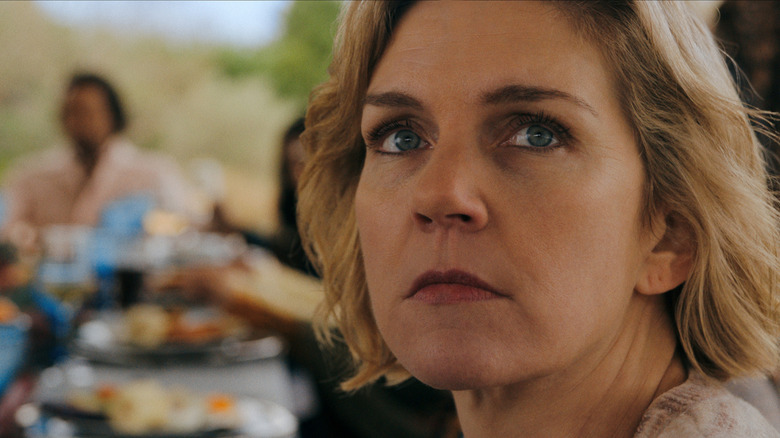Pluribus Remixes Two Classic Sci-Fi Tropes Into Something Truly Unexpected
Warning: This article contains major spoilers for episodes 1 and 2 of "Pluribus."
What the heck is "Pluribus" even supposed to be? We're not referring to the literal title, which is rather quickly explained in the first half of the premiere. Instead, the Apple TV series from "Breaking Bad" and "Better Call Saul" visionary Vince Gilligan has had something else up its sleeve all along. Prior to release, the marketing has seen fit to keep the actual premise almost completely under wraps. All we've known going in is that the story follows Rhea Seehorn's Carol Sturka as, apparently, "the most miserable person on Earth" and very little else. Vaguely ominous and possibly apocalyptic imagery in the bite-sized teasers have hinted at something larger going on, not to mention fan-theories running rampant and ranging anywhere from zombies to alien invasions to everything in between.
The truth, as it so happens, might as well be the best of both worlds. The debut episode, titled "We Is Us" and written/directed by Gilligan, knowingly plays into the extraterrestrial angle by opening with astronomers working on the SETI project (Search for Extraterrestrial Intelligence) or a SETI-like organization. This is further amplified upon the discovery of a strange signal of unknown origins, which fully kicks off the events of the series. But when things inevitably go awry when — as so often happens — a pair of scientists get a little too casual handling animal experiments, the next genre Gilligan leans into appears to be a potential viral outbreak. When this doesn't exactly prove to be the case, the next logical assumption is that this is secretly a zombie narrative.
The ultimate hive mind twist, however, takes all of these classic science fiction tropes and remixes them into the most unexpected one of all.
Pluribus subverts our sci-fi expectations every step of the way
Leave it to Vince Gilligan to upend all our assumptions and turn "Pluribus" into the rarest of shows these days — one that actually keeps us guessing from one moment to the next. Although recent water-cooler breakthroughs like "Severance" or "Succession" accomplished very similar results from week to shocking week, the majority of our biggest streaming options these days have been based on material that we know the overall destination to: the prequel series "Andor," or the live-action adaptation of "The Last of Us," or even the recent "It: Welcome to Derry." (It's worth noting that Gilligan turned arguably one of the more head-scratching prequel ideas in recent memory, "Better Call Saul," into a sensation that might even rival that of "Breaking Bad.")
So, right on cue, here comes "Pluribus" to take the trappings of the most well-known sci-fi narratives and mash them together into one that feels wholly fresh and original. Yes, Gilligan wears inspirations like "Invasion of the Body Snatchers" or "The Twilight Zone" on his sleeve, but art is all about taking the familiar and spinning it into something new. As we follow Carol down this increasingly nightmarish rabbit hole, where the individuality that once defined the human race has been replaced in a hostile takeover by one insufferably amiable consciousness, the true horror of this scenario comes to light. What is freedom in a world with no actual sense of free will? What makes us human if we no longer can be bothered to fight for what we feel is right? What's so bad with embracing the inevitable instead of stubbornly pushing against the new status quo?
These are the uncomfortable questions "Pluribus" asks of us, in a way few other shows ever could.
Pluribus pulls off what zombie or alien invasion shows simply can't
Even though creator Vince Gilligan insists "Pluribus" only ended up a sci-fi story in the first place due to happenstance, it's easy to see why he chose to depict the events of the series through this genre lens. Granted, Gilligan's options to explain such otherworldly phenomenon were obviously rather limited. Still, he could've easily explained this away through any number of sci-fi shenanigans. Instead, he landed very specifically on the idea of a hive mind triggered by a virus that was (most likely) sent to us by aliens that essentially turns 99% of the population into unthinking zombies — an amusingly grab-bag approach that mirrors the show's own major thematic idea of taking the many and turning them into one.
The final result is that "Pluribus" does what countless other shows simply could not. As much as "The Walking Dead" kept 2010s audiences in a chokehold, the inherent limits of the genre meant that it could really only support one source of drama over and over (and over) again: What if humans were, like, the real walking dead, man? Even "Prestige TV" shows like "The Last of Us" can't fully escape that very same notion. Netflix's "3 Body Problem," a show we're on record championing, operates with one arm tied behind its back as it builds towards its own spin on alien invasions.
"Pluribus," meanwhile, is free to take the best parts of post-apocalyptic media and elevate the rest. Unlike zombies or aliens, Carol's "enemy" doesn't wish to harm her. The band of survivors here don't even like our main hero. And we're left to wonder whether the end of the world is really so bad, after all. New episodes stream on Apple TV every Friday.


